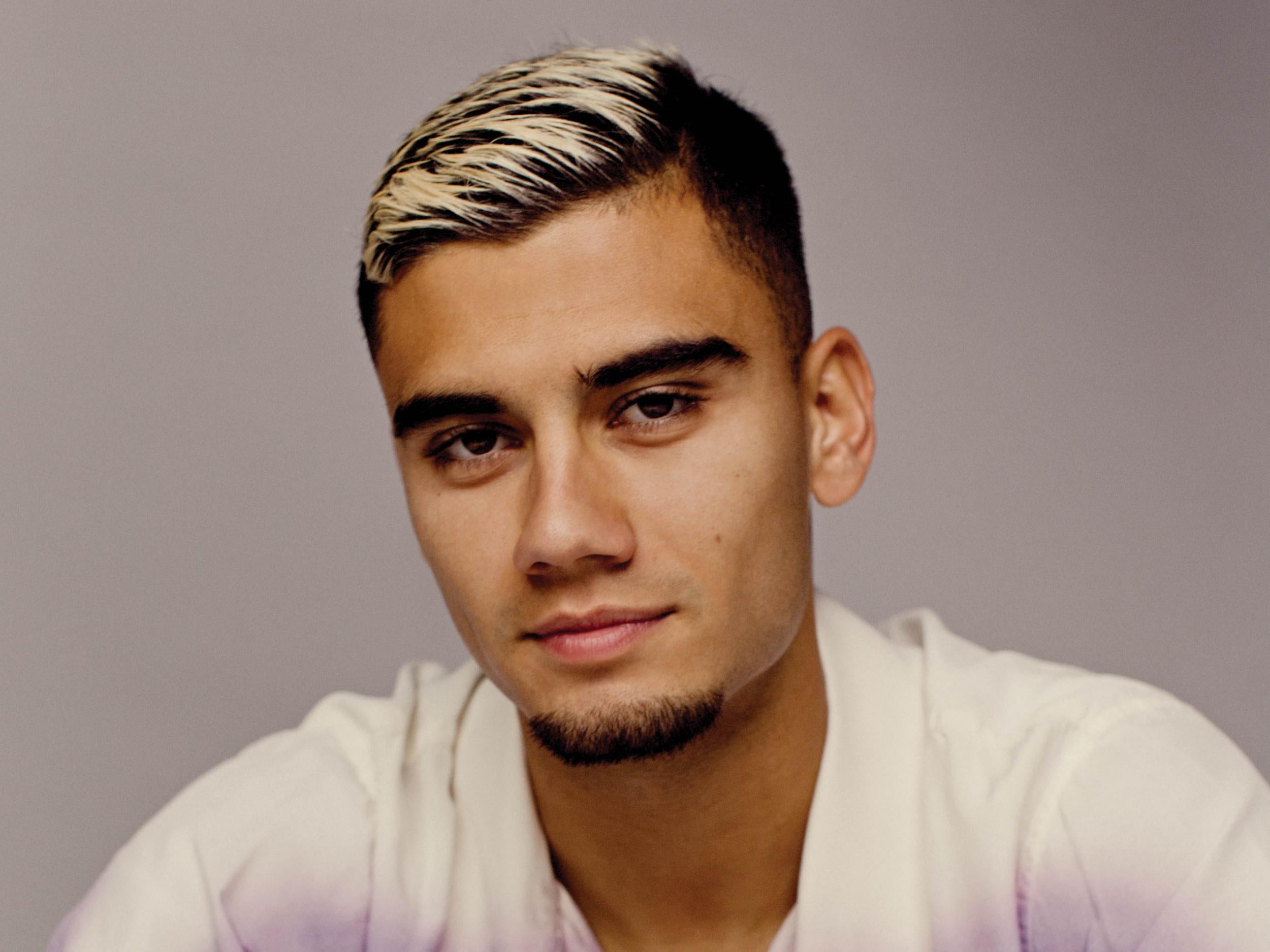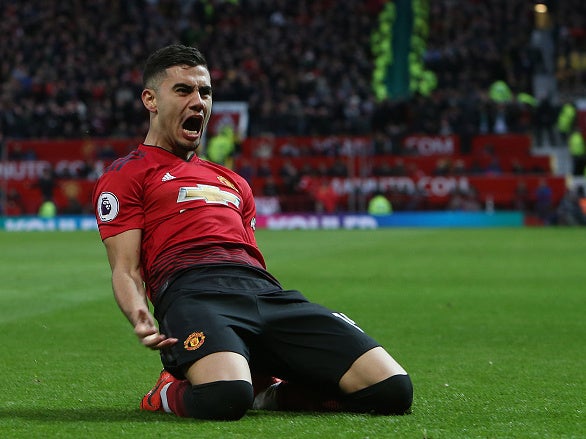Manchester United’s Andreas Pereira, the curse of versatility, and finding his feet at Old Trafford
Exclusive interview: The Brazilian midfielder discusses finding a sense of belonging under Ole Gunnar Solskjaer

Your support helps us to tell the story
From reproductive rights to climate change to Big Tech, The Independent is on the ground when the story is developing. Whether it's investigating the financials of Elon Musk's pro-Trump PAC or producing our latest documentary, 'The A Word', which shines a light on the American women fighting for reproductive rights, we know how important it is to parse out the facts from the messaging.
At such a critical moment in US history, we need reporters on the ground. Your donation allows us to keep sending journalists to speak to both sides of the story.
The Independent is trusted by Americans across the entire political spectrum. And unlike many other quality news outlets, we choose not to lock Americans out of our reporting and analysis with paywalls. We believe quality journalism should be available to everyone, paid for by those who can afford it.
Your support makes all the difference.Andreas Pereira is searching for definition.
Last week, the midfielder celebrated the fifth anniversary of his Manchester United debut, but the questions that followed his run-out in a behind-closed-doors friendly against Sheffield United remained numbingly familiar. At its core, in the way we like to confine and compartmentalise footballers into boxes, do we know what player Pereira is trying to be? Do we even know his best position?
Versatility is Pereira’s gift and curse. He arrived at United as a prolific teenage forward, but has regressed into a not quite definable midfielder, trialled in almost every position. An any-weather cagoule, never quite tailored to a clear occasion. In United’s opening game of the season, a 4-0 drubbing of Chelsea, he started as a nominal No 10, dropping between the lines to allow the more incisive trio of Anthony Martial, Marcus Rashford and Jesse Lingard to run beyond. Yet, his own imprint on the match – an assist for Martial’s goal – was a footnote against anonymity, touching the ball and completing fewer passes than any of his teammates.
The scars are familiar. Just as under Jose Mourinho last season, Pereira lost his place in the starting XI. By the time United bounded clumsily to defeat against Crystal Palace, he had been relegated to an unused substitute.
Utility has become a catch-22. Pereira can be trusted to glue almost any gap in the club’s depleted midfield and features more as a result. But, with that, comes the unshakeable feeling that his talent is being spread too thin. That we have never seen his ability distilled and expressed down one avenue and, with it, the notion that he has never quite been allowed to display his full potential.
“It’s difficult being a midfielder in today’s modern game,” he acknowledges. “For a midfielder now you have to be strong, fast and see the play very quickly. You have to be very versatile.”
It’s a craving for singularity that is symbolic of Pereira’s own grappling with identity. At the beginning of last season, he changed the name on the back of his shirt to ‘Andreas’ to separate himself from his father’s playing legacy in Belgium. He was raised in Duffel, whose most famous resident is a thick woollen cloth, but points proudly to his veins and notes the boiling Brazilian blood. His hair is sequinned by glossy dyes that can’t help but covet attention. As a person, he is light-hearted but sharp, articulate in five languages, with a work ethic beloved by United’s coaching staff. Yet, it’s hard to avoid the sense that, up until now, we haven’t seen his personality infiltrate into his football.

“I feel like I have a good mixture now between European discipline and the flair of Brazilian players,” he says. “I think it’s important to show that character on the pitch, to show your identity and who you are.
“When I was young, living in Belgium, my parents spoke Portuguese, we have the Brazilian passion at home, I played with PSV in Holland, you experience all these different cultures and you get used to living with that. I think it has made me a better player and a better person to get out of my comfort zone. Sometimes you can get a bit down but you have to pick yourself up every day and fight and I think that has always made me stronger.”
At 23, Pereira is by no means a youngster anymore. In fact, by way of United’s warped squad, he is if anything a senior player. Yet his path to this point has always felt interrupted. Thrilling pre-seasons a matter of seasonal fair, yet quickly followed by cold and enduring intermissions. There were the two years spent idling on the periphery of the first-team before a professional baptism at Granada, thrust into a failing relegation battle.
The following year, on loan at Valencia against the will of Jose Mourinho, Pereira added a new layer of technique and tenacity. His defiance was rewarded. Upon his return, Mourinho hailed Pereira, in the Portuguese’s tortured off-kilter fashion, as “no longer a number”. This was the season where he was set to realise the potential nurtured since he first joined the club in 2011.

Yet, as Mourinho’s tenure met its strangled apocalypse, Pereira became the early casualty, dropping out of the matchday squad almost entirely after the season’s opening fortnight, bobbing aimlessly amid the havoc. But with the benefit of patience, Solskjaer sought to unlock the puzzle that has promised and frustrated, reintegrating Pereira into the starting line-up, where he impressed blanketing all matter of positions. In the summer, he was rewarded with a new four-year deal.
“For me, it has been massive,” he says of Solskjaer’s support. “It’s very important to me that he speaks highly about me and I just want to do my best on the pitch to show the faith back to him. It’s very important for the young players to be given this confidence and, then if you have the chance, you have to take it with both hands.
“We have a very positive way of playing now,” he says, in reference as close as he dares to the discarded regime. “It’s a style I like a lot. We’re moving in the right direction and everyone has the same mindset so I think we can achieve great goals this season.”

Pereira’s personal goal, and the anxiety that carried him twice to Spain, remains the same. Not just to become a regular in the starting XI, but to forge his own legacy as a player, to be more than his father’s son – something already achieved in everybody’s eyes except, perhaps, his own. Whether he can capture his full potential in the eyes of supporters, however, remains almost as mysterious and mercurial as ever. With United certain to reinvest in their midfield next summer, Pereira must prove he is an individualist; a talent worthy of its own mould, rather than a conforming part to the pieces around him.
But after a short career that’s so often felt stop-start, the key might in fact be something rooted away from the pitch. After eight years in England, Pereira finally feels settled. “It was difficult when I first moved to Manchester,” he says. “I’ve spent more time at this club than anywhere else now. I love this club. I love this city. Whenever I’m in Manchester, it feels like home.”
GAFFER Issue 02: Heart & Soul honours the way football cultivates community spirit, empowers the next generation and gives fans, teams and players something bigger and more beautiful to believe in
Join our commenting forum
Join thought-provoking conversations, follow other Independent readers and see their replies
Comments